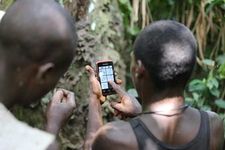ExCiteS forest monitoring: Difference between revisions
No edit summary |
No edit summary |
| (3 intermediate revisions by the same user not shown) | |
(No difference)
| |
Latest revision as of 16:45, 21 October 2013
Cs Portal > List of citizen science projects > ExCiteS forest/poaching monitoring projects in the Congo Basin - (2013/09/25)
IDENTIFICATION
- Beta start date : N/A
- End date : Still open.
- Natural sciences > Human-Computer Interaction, Anthropology, Software Engineering, GIScience (nature/conservation)
- Others in the same subject areas: Air Quality with Biomarkers, Andromeda Project, Bat detective, Budburst... further results
- Others projects about nature/conservation: Air Quality with Biomarkers, Bat detective, Celebrate Urban Birds, Evolution MegaLab... further results
⇳ Description A mobile application plus a platform which enables local communities to use a smartphone to compile and share a report on forest activity around their habitat. ➠ Purpose Develop a system of participatory monitoring for forest management – specifically the social impact of logging. In a more global perspective, the goal is to let communities build so-called Community Memories: evolving, shared representations of the state of their environment, their relationship with it, and any threats it faces. ? Research question There are both "global" and "local" questions, for example:
- how to design tools and practice that allow citizens to understand their environment and to participate in its management.
- How to create tools that allow anyone to capture data, share data, analyse data and use them.
- How to work in difficult technical conditions (weak GPS signal, no electricity, lack of Internet, etc.)
TEAM
University College London, London, UK
Project team page http://www.ucl.ac.uk/excites/projects/excites-projects/intelligent-maps/intelligent-maps Leader: Muki Haklay Institution: Partner institutions: Contact:
USER TASKS
CONTRIBUTION TYPE: data collection, data analysis, data interpretation
PARTICIPATION TYPOLOGY: extreme citizen science
GAMING GENRE NONE
GAMING ELEMENTS: NONE
◉ Tasks description The Congo project comprises several projects using different technology over time. ⤯ Interaction with objects
▣ Interface
- Data type to manipulate: pictures, text, observations
- interface enjoyment: cool/attractive
- Interface usability: easy to use
GUIDANCE
- Tutorial: Somewhat
- Peer to peer guidance: Somewhat
- Training sequence: Somewhat
- Individual performance: Somewhat
- Collective performance: Somewhat
- Research progress: Somewhat
❂ Feedback and guidance description
COMMUNITY
- Communication:
- Social Network: N/A
- Member profiles:: N/A
- Member profile elements:
- Main news site:
- Frequency of project news updates: N/A
- Type of events:
- Frequency of events :
⏣ Community description
- Community size (volounteers based)
- Role:
- Interaction form:
- Has official community manager(s): N/A
- Has team work N/A
- Other:
- Community led additions:
Other information
PROJECT
Url:http://www.ucl.ac.uk/excites/projects/excites-projects/intelligent-maps/intelligent-maps
Start date: 2012/02/01
End date: Still open
Infrastructure: ExCiteS
TEAM
Official team page:http://www.ucl.ac.uk/excites/projects/excites-projects/intelligent-maps/intelligent-maps
Leader: Muki Haklay
Main location: University College London, London, UK
PROJECT DEFINITION
Subject
Natural sciences > Human-Computer Interaction, Anthropology, Software Engineering, GIScience (nature/conservation)
Description
A mobile application plus a platform which enables local communities to use a smartphone to compile and share a report on forest activity around their habitat.
Purpose.
Develop a system of participatory monitoring for forest management – specifically the social impact of logging. In a more global perspective, the goal is to let communities build so-called Community Memories: evolving, shared representations of the state of their environment, their relationship with it, and any threats it faces.
Research question.
There are both "global" and "local" questions, for example:
- how to design tools and practice that allow citizens to understand their environment and to participate in its management.
- How to create tools that allow anyone to capture data, share data, analyse data and use them.
- How to work in difficult technical conditions (weak GPS signal, no electricity, lack of Internet, etc.)
ABOUT PARTICIPANT TASKS
Tasks description.
The Congo project comprises several projects using different technology over time.
.
| Grey typology | Participation typology | Contribution type: | ||||||||||||||||||||||||||||
|---|---|---|---|---|---|---|---|---|---|---|---|---|---|---|---|---|---|---|---|---|---|---|---|---|---|---|---|---|---|---|
|
|
|
||||||||||||||||||||||||||||
| Gaming | ||||||||||||||||||||||||||||||
| Genre: | Gaming elements: | |||||||||||||||||||||||||||||
| Interface | ||||||||||||||||||||||||||||||
| Data type to manipulate: pictures, text, observations | interface enjoyment: cool/attractive Interface usability: easy to use |
Member profiles::N/A Member profile elements: |
||||||||||||||||||||||||||||
ABOUT GUIDANCE AND FEEDBACK
| Guidance | Feedback on | ||||||||||||
|---|---|---|---|---|---|---|---|---|---|---|---|---|---|
|
|
.
COMMUNITY
| Tools | News & Events |
|---|---|
|
Communication: |
Main news site: |
| Community description | |
|
Community size (volounteers based): |
|
Other information about community:
Community led additions:
OTHER PROJECT INFORMATION
Intelligent Maps - Pygmies.jpg Yes [[has completion level::Low]
http://www.ucl.ac.uk/excites/projects/excites-projects/intelligent-maps/intelligent-maps
University College London, London, UK
Yes
Human-Computer Interaction, Anthropology, Software Engineering, GIScience
Natural sciences
nature/conservation
Develop a system of participatory monitoring for forest management – specifically the social impact of logging. In a more global perspective, the goal is to let communities build so-called Community Memories: evolving, shared representations of the state of their environment, their relationship with it, and any threats it faces.
There are both "global" and "local" questions, for example:
- how to design tools and practice that allow citizens to understand their environment and to participate in its management.
- How to create tools that allow anyone to capture data, share data, analyse data and use them.
- How to work in difficult technical conditions (weak GPS signal, no electricity, lack of Internet, etc.)
Congo ExCiteS forest/poaching monitoring projects in the Congo Basin The Congo project comprises several projects using different technology over time. data collection, data analysis, data interpretation
extreme citizen science pictures, text, observations, other: Thinking: yes Computing: no Sensing: yes Gaming: no
cool/attractive easy to use N/A N/A N/A N/A N/A N/A
N/A
N/A
N/A
N/A
N/A
Low
Remarks
- There is no official project title (except the global ExCiteS one)
- The project evolves over time. It addresses different subjects, e.g. poaching and logging and technology changes.
Bibliography
| BIBLIOGRAPHY |
.Participatory monitoring of poaching in the Congo basin. Michalis Vitos, Jerome Lewis, Matthias Stevens, Muki Haklay (2013)
- ➥ http://discovery.ucl.ac.uk/1393554/
- ✄ Stevens, M., Vitos, M., Lewis, J., & Haklay, M. (2013). Participatory monitoring of poaching in the Congo basin. GISRUK 2013, 21st GIS Research UK conference (April 2-5, 2013, Liverpool, England, UK).
.Participatory monitoring of poaching in the Congo basin. Michalis Vitos, Jerome Lewis, Matthias Stevens, Muki Haklay (2013)
- http://discovery.ucl.ac.uk/1393554/
- Stevens, M., Vitos, M., Lewis, J., & Haklay, M. (2013). Participatory monitoring of poaching in the Congo basin. GISRUK 2013, 21st GIS Research UK conference (April 2-5, 2013, Liverpool, England, UK).
Making local knowledge matter: supporting non-literate people to monitor poaching in Congo. Michalis Vitos, Jerome Lewis, Matthias Stevens, Muki Haklay
Making local knowledge matter: supporting non-literate people to monitor poaching in Congo. Michalis Vitos, Jerome Lewis, Matthias Stevens, Muki Haklay
Participatory Mapping in Congo-Brazzaville (Part 1). Michalis Vitos
Participatory Mapping in Congo-Brazzaville (Part 1). Michalis Vitos



